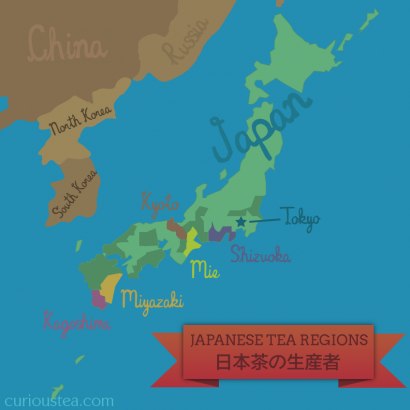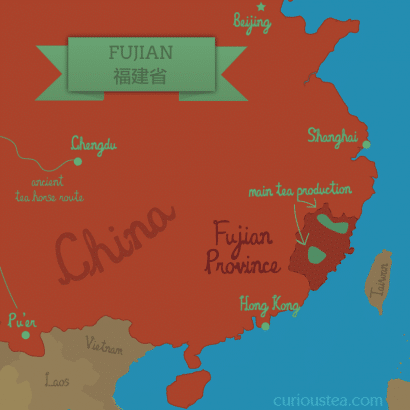Welcome to the February 2023 edition of the Curious Tea subscription! Here’s a closer look at the four exciting new teas that we are sharing with our subscribers this month.
The first light tea this month is a classic Iron Goddess of Mercy Oolong from Fujian Province in China that is gently oxidised to produce a refreshing floral flavour.
The second light tea is an unusual green tea from Japan that has a distinctive curled leaf appearance and is specially processed for an increased GABA content.
For the dark side of the selection we have another Japanese tea, this time a black tea from Ashikita that is crafted from native ‘zairai’ plants.
Finally, the last tea we are featuring this month is a famous tea from Taiwan, a complex Dong Ding Oolong that delivers a deeply satisfying flavour.
Our Discovery subscription boxes contain 10g taster pouches of all of the above mentioned teas. If you are a subscriber you will benefit from a 10% discount on all teas from our tea shop!
Let’s get into further detail on these teas featured in our February tea subscription boxes.
Fuji GABA Tamaryokucha
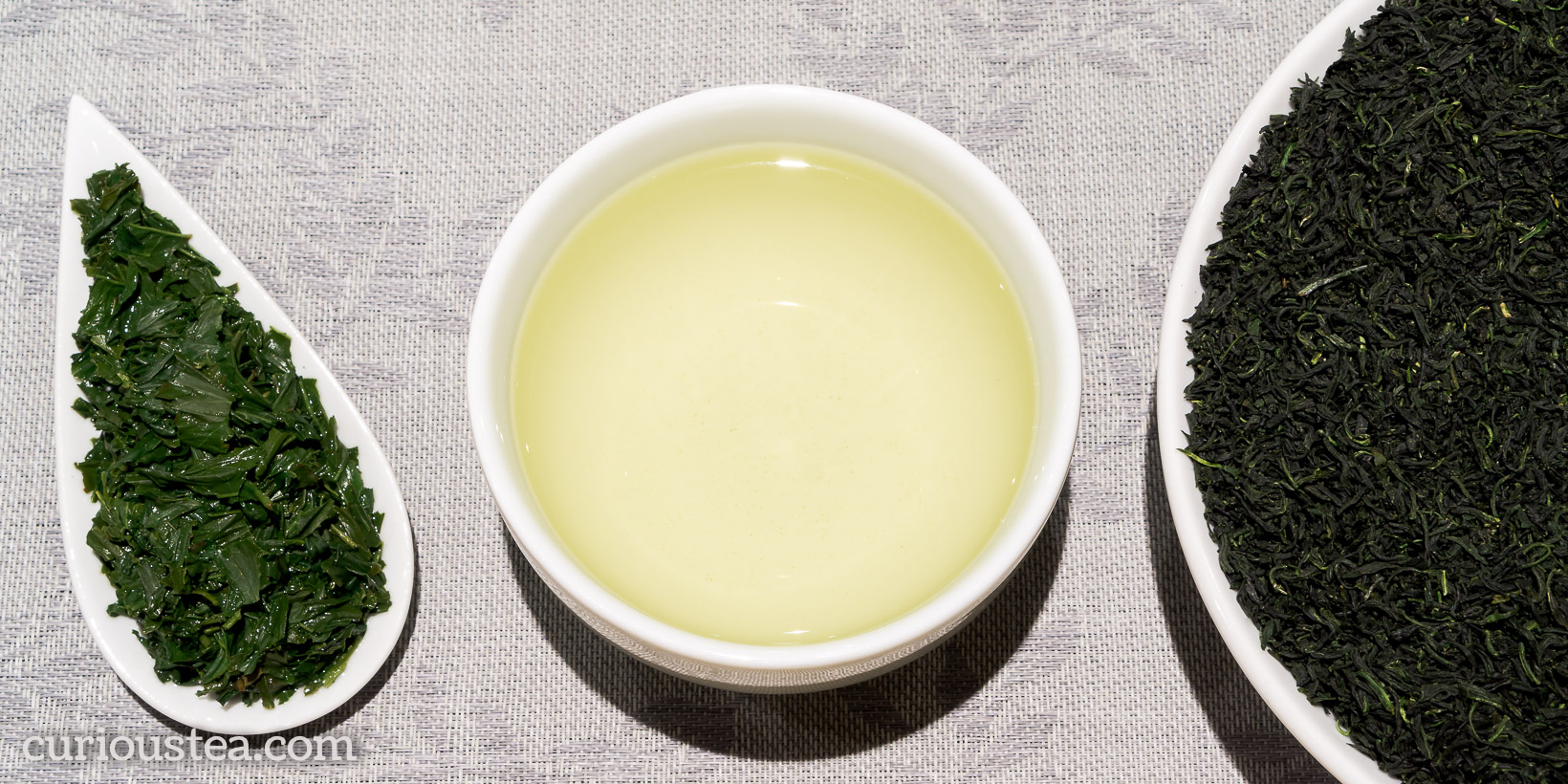
Fuji GABA Tamaryokucha (富士ギャバ玉緑茶) is a green tea that is grown on the slopes of Mt Fuji in Shizuoka Prefecture. Tamaryokucha is also commonly known as guricha in Japanese, a type of steamed green tea that has a distinctive curled leaf appearance. This version is further processed in an oxygen-deprived environment to increase the GABA content. The resulting GABA green tea has an attractive taste that reduces the vegetal and grassy flavours, while introducing a more tart fruity aspect. It is also commonly known as Gabaron tea in Japan (ギャバロン茶). We source this tea from a specialist small wholesaler in Shizuoka who works directly with the farmers. They specifically support smaller farmers in distributing their teas, developing new tea types, improving their techniques and providing additional end processing and refining at their small tea factory in Makinohara. This current batch was picked on 5 May 2022.
The name tamaryokucha (玉緑茶) literally translates as ball green tea into English. The alternative name for the steamed version of tamaryokucha is mushiguri (蒸しぐり) or guricha (ぐり茶), meaning (steamed) curly tea. The processing method for tamaryokucha follows that of sencha. The only difference is that the last step in processing, which is shaping, is omitted. The shaping stage gives the straight leaf appearance to the classic sencha leaf. As tamaryokucha is not shaped, the leaf retains the natural curl or coil shape. This also means that fewer leaves are broken during processing, resulting in a larger leaf. In terms of flavour, it also contributes to a smoother, less astringent and less drying flavour.
While this tea is positioned as a ‘health tea’ in Japan due to the high GABA (Gamma-aminobutyric acid) and theanine levels, we also do find it to be delicious! The GABA content in the dry leaf for this batch was measured at 250mg/100g, making it by far the highest confirmed content in any of our GABA teas. The level of theanine was measured at 2900mg/100g of dry leaf. As with all GABA tea, this tea undergoes a period of processing in an oxygen deprived environment (in this case around 8 hours). Typically this involves placing the tea leaves in a special vacuum tank that is then flushed with nitrogen. The leaves undergo a very light but very slow oxidation that vastly increases the GABA content.
Even though the GABA tea processing was invented by Japanese scientists, it was Taiwanese tea growers who really popularised it. While GABA Oolong from Taiwan is the most popular and common type at the moment, some GABA Green tea is also produced in Taiwan. Japan is also producing GABA green tea, but the production is limited and most of this tea stays in Japan. While personal experiences vary, many tea drinkers experience a calming and relaxing effect on the body that is combined with clarity of mind from this type of tea. It’s a perfect choice when practicing meditation, yoga and Tai Chi.
This GABA green tea has a typical appearance for a Tamaryokucha, which represents a neat, curly dark green leaf. Some small amount of stalks is also present that lends a bit of extra sweetness. It produces a bright green-yellow liquor with a vegetal and fruity aroma. The smooth taste has pronounced fruity vegetal notes. Combined with a savoury herbaceous aspect, the notes are reminiscent of green vine tomatoes and underripe fruits. The aftertaste is lasting, with a tangy and sour note that is commonly found in GABA teas, while further infusions bring out more citrus flavours. This tea serves as a great example of a GABA green tea as it possesses both the classic Japanese green tea flavours but also the unmistakeable fruity and tart aspect that results from the specialist processing.
It is best brewed at 80°C for around 2-3 minutes, with multiple infusions. For a more traditional style of brewing, the farmer specifically recommends using a traditional Japanese tea pot and to brew 3g in 100ml of water at 70°C for 1 minute, followed by further 45-60 second infusions until no flavour is left.
You can also buy this Fuji GABA Tamaryokucha green tea in our online shop.
Tie Guan Yin Iron Goddess of Mercy Oolong
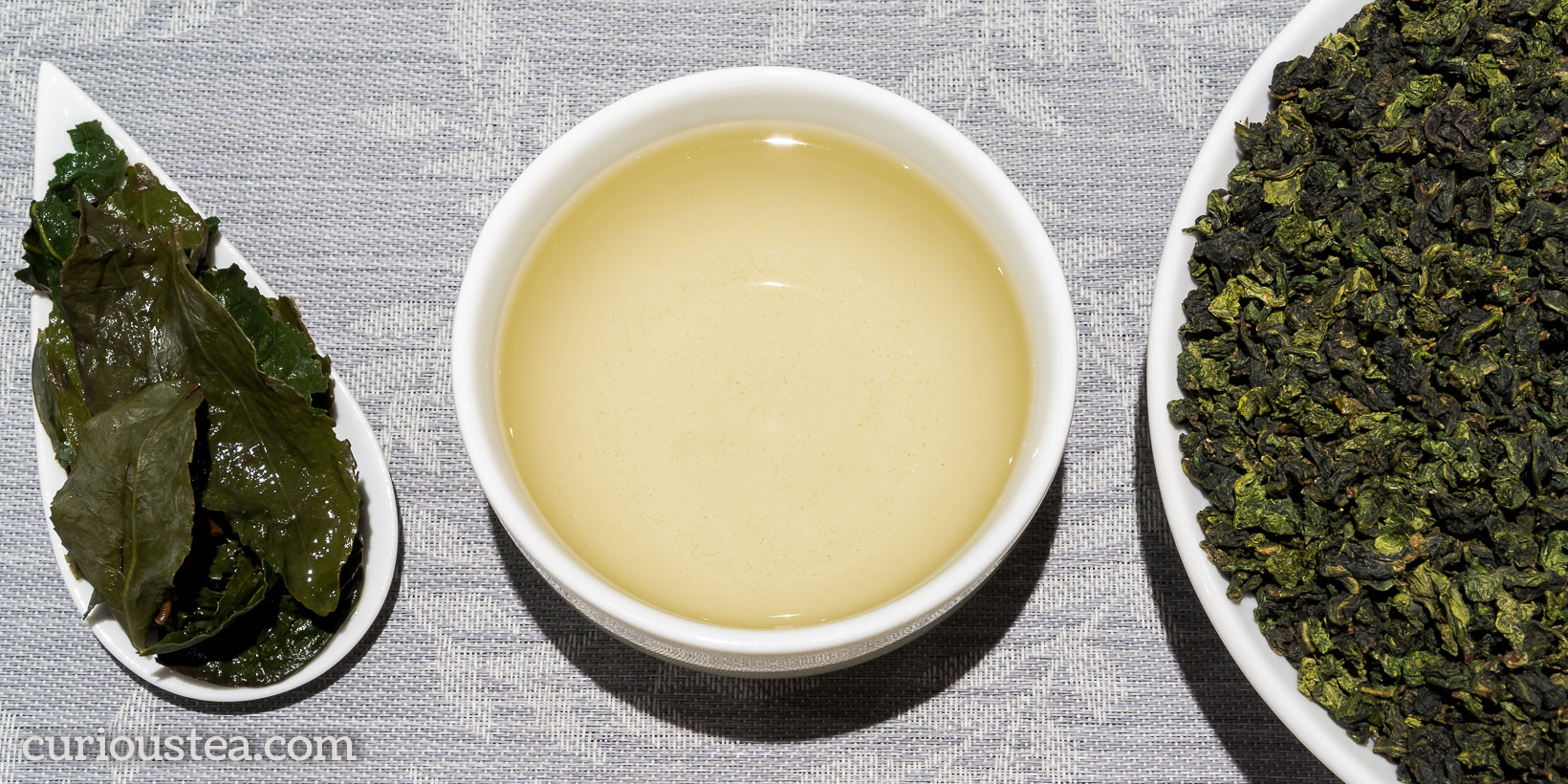
Tie Guan Yin (铁观音) Iron Goddess of Mercy is our premium version of a truly classic Chinese oolong. This one comes from Anxi County in Fujian Province, the birthplace of this very famous and popular tea. This Tie Guan Yin Oolong is an Anxi-style tea, which means that it is lightly oxidised, retaining many of the delicate floral aspects that are a closer to a light green tea without the grassiness or astringency. This type of oolong has become known as a ‘jade’ or ‘green’ oolong due to the light appearance and colour that is reflected both in the leaves of this tea as well as the light coloured liquor. This particular crop of our Tie Guan Yin Iron Goddess of Mercy oolong was plucked in spring, May 2022, in Anxi County of Fujian Province in China.
The tea is named after the Chinese name for a bodhisattva known in Sanskrit as Avalokiteśvara, Guan Yin (观音). Guan Yin is a buddhist bodhisattva usually associated with compassion; it is also known in Japan as Kannon Bosatsu (観音菩薩) and in Korea as Gwan-eum (관음). Other spellings and names for this tea include TGY, Ti Kuan Yin, Tit Kwun Yum, Ti Kwan Yin, Iron Buddha, Iron Goddess Oolong and Tea of the Iron Bodhisattva. The English name ‘Iron Goddess of Mercy’ is a literal translation of ‘Tie Guan Yin’ and is the most common English name for this Chinese oolong.
There are two legends that explain the origin of the name of Tie Guan Yin Iron Goddess of Mercy oolong. One tells a story of a scholar called Wang who discovered a tea plant under Guan Yin rock, brought it home and then cultivated this tea. When he brought this tea to the Emperor as a gift, the Emperor liked the tea so much he wondered where this tea originated. As it was found under the Guan Yin rock, it was decided to call it Guan Yin tea.
Another legend tells a story of a poor farmer called Wei. There was a temple with an iron statue of Guan Yin on the way from the tea fields that Wei walked past every day and he noticed that the condition of the temple was worsening. He decided to do something about it so he took it upon himself to clean the temple and light incense in it twice a week; he proceeded to do that over many months. One night Guan Yin appeared to him in his dream telling him that there was a cave behind the temple with treasure that awaited him. Upon entering the cave Wei discovered a tea plant shoot. He planted it in his field and nurtured it into a large tea bush. This tea plant produced the finest tea, so he shared the cuttings from this bush with all his neighbours. Wei and his neighbours started making and selling this fine tea under the name Tie Guan Yin. As they prospered from it, they were able to fully repair their beautiful temple.
This oolong undergoes a complex production process that results in quite a characteristic tea and is shared with other light Anxi-style oolong teas. The processing goes through the following stages: plucking of tea leaves, sun withering, cooling, tossing, withering with slight oxidation, further tossing and withering, fixation, rolling, drying, sorting and finally packing. As the tea nears the completion of this process, the distinctive colouration of the leaves becomes apparent. This can be seen on the dried leaves, they become quite light in colour on the edges, almost frosted in places. This is a distinguishable feature of a well-made and correctly processed Tie Guan Yin Iron Goddess of Mercy oolong.
The tightly rolled light green, jade coloured leaves of this Tie Guan Yin Iron Goddess of Mercy oolong have a slight green floral aroma. When brewed, the leaves unfurl, producing a pale golden clear liquor with a floral scent. The taste is light, with a pronounced floral profile and refreshing flavours of fresh green vegetables with a buttery note and a little sweetness reminiscent of red peppers. The lasting aftertaste has more floral flavours. This is a light and refreshing tea with a smooth and balanced flavour and no bitterness or astringency.
This oolong is best brewed at 90°C for around 3 minutes according to your taste and can be brewed more than 3 times, increasing steeping time with each next brew if desired.
You can also discover all four famous Anxi oolongs in our online shop: classic Tie Guan Yin Iron Goddess of Mercy, crisp and zesty Mao Xie Hairy Crab, refreshingly floral Ben Shan Source Mountain and the most floral Huang Jin Gui Golden Osmanthus.
Ashikita Zairai Wakocha
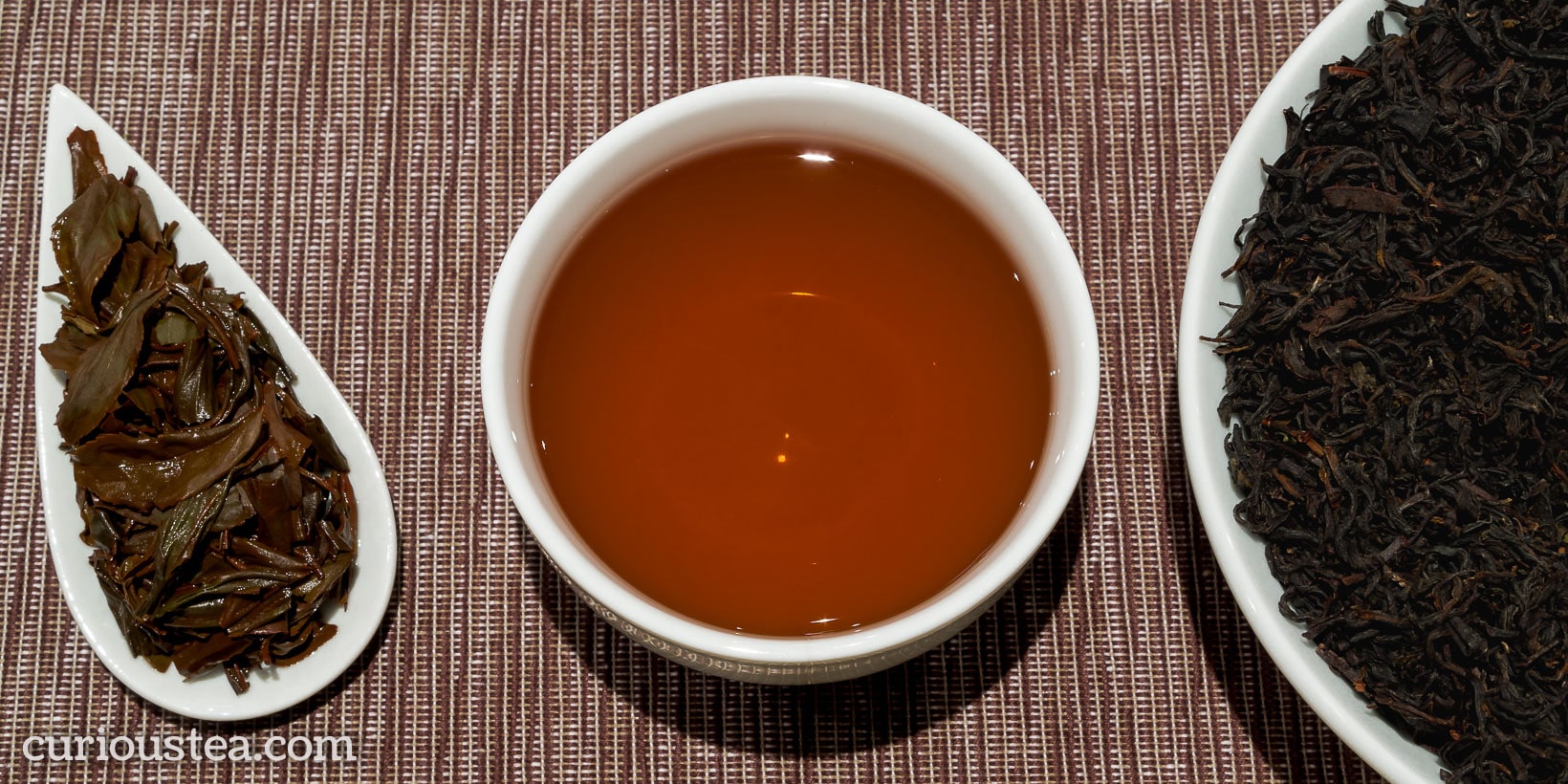
Ashikita Zairai Wakocha (芦北在来和紅茶) is a fruity Japanese black tea crafted from a zairai or ‘native’ cultivar. It is grown on a small family-run farm operating to organic standards in Ashikita District of Kumamoto Prefecture. Here the tea farmer utilises a zairai tea plant to create a unique tea that represents a more heritage style of processing. The current crop on offer is from the second flush harvest picked in June 2022. We source this tea direct from the grower, Mr Toshihiro Kajihara.
This Ashikita Zairai Wakocha black tea is crafted from a zairai (在来), or ‘native’ cultivar. In reality, this term does not refer to a single cultivar in a classic sense. Rather, zairai in Japan refers to any collection of ‘native’ tea plants. Generally these are old tea gardens with plants that pre-exist modern cultivars and have therefore evolved on their own. Most times these plants would also be grown from seeds rather than cuttings, thus greatly diversifying the variety of the plants of the garden. The zairai plants at this tea garden were planted over 60 years ago using seeds from other ‘native’ tea plants.
Generally zairai gardens produce lower yields and are less uniform in output. This is a negative aspect for the farmers as it makes harvesting and processing more costly and complicated while yielding lower returns. It also goes against traditionalist Japanese way of thinking regarding tea processing where uniformity of tea between different years and harvests is key. However zairai gardens are very much part of the Japanese tea heritage and give a fascinating insight into what tea used to be like before modern selection processes and cultivars were introduced.
Wakocha (和紅茶), or Japanese black tea, is still rather rare and sourcing it can be quite complex due to small production levels and mixed results. Different cultivars are utilised for producing different Wakocha black teas with different flavour profiles. For example our Makinohara Benifuki Wakocha has a more broken leaf and a much bolder black tea profile. This Native Wakocha by comparison delivers a much more delicate and complex flavour that results in a beautifully fruity profile that is reminiscent of lighter, fruitier Taiwanese black teas.
This Ashikita Zairai Wakocha black tea consists of neat and even, dark twisted leaves. The liquor produced has a red-bronze colour, with medium clarity and brightness. The aroma from the liquor and the wet leaves is that of sugared plums. The fruity profile has a delicate, light character with notes of red stony fruits and spiced stewed plums. There is pleasant savouriness to the liquor that is finely counterbalanced by subtle sweetness. The lasting aftertaste is clean, with mineral and stony flavours. This is a satisfying and comforting tea that achieves a good balance of flavours and medium complexity.
It is best brewed at 90°C for around 3 minutes, with multiple infusions.
You can also buy this Ashikita Zairai Wakocha black tea in our online shop. You may also be interested in other teas crafted by Kajihara-san.
Dong Ding Oolong
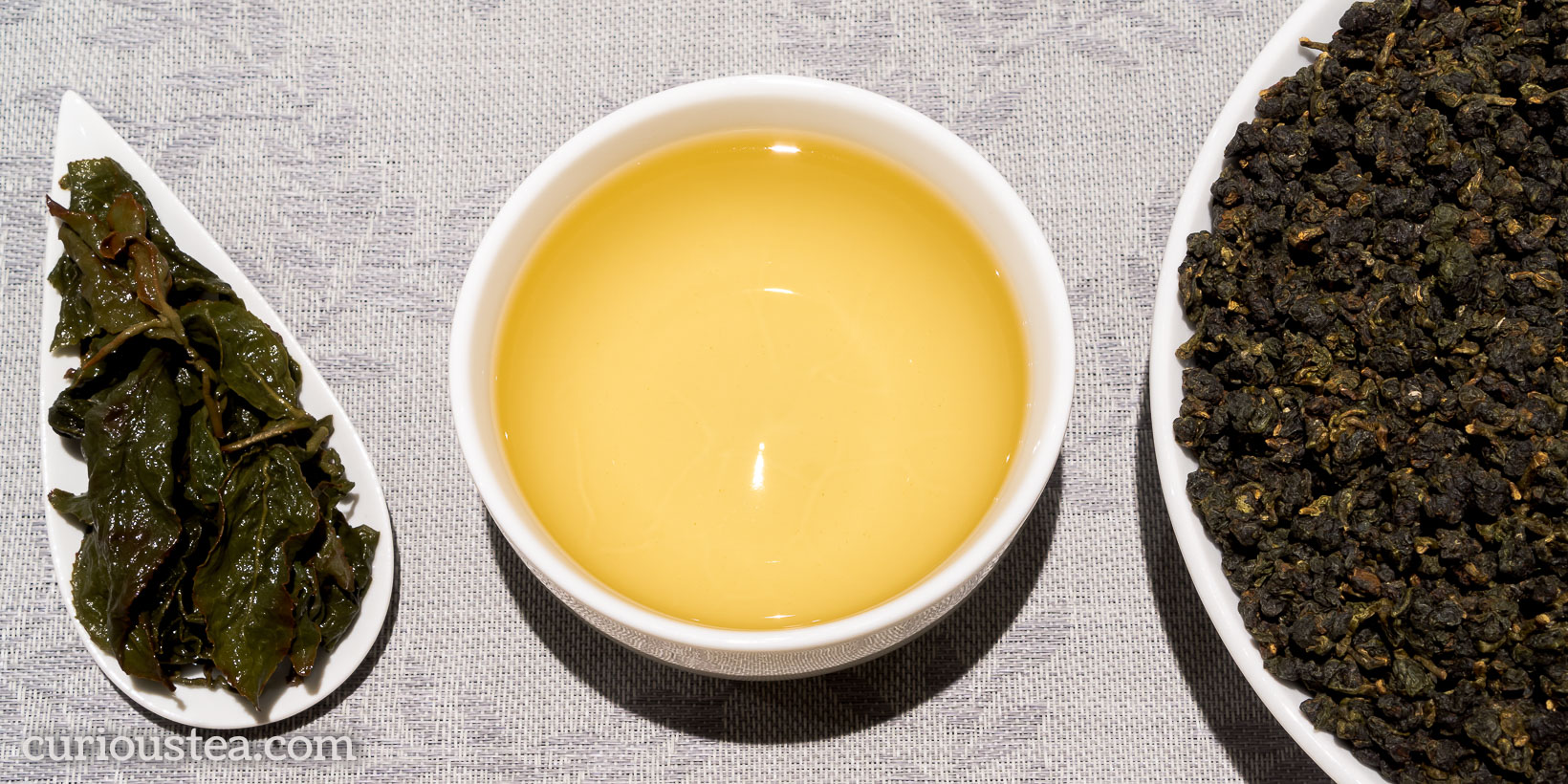
This Dong Ding Oolong (凍頂烏龍茶) is another product from our tea master in Taiwan and we are very excited to feature such a great example of this popular tea. The name Dong Ding means ‘Frozen Peak’ and is named after a mountain in the area where this tea originally comes from. This tea is from November 2022 harvest, baked by our tea master in November 2022.
Originally Dong Ding Oolong (also known as Tung Ting Oolong) comes from Lugu Township in Nantou County where it is made from the Qing Xin cultivar. Due to the huge rise in popularity of Dong Ding Oolong, that area can no longer cope with the demand and other areas around Taiwan started growing and producing Dong Ding style oolongs. It is now accepted by many that Dong Ding not only refers to the original tea made from Qing Xin cultivar grown in Lugu but has now become the name to describe a particular style of tea that is very similar to that original tea. Some tea purists will not necessarily agree with that, but there are certainly some fantastic versions of Dong Ding Oolong available, both in the more traditional baked style as well as in a more lightly oxidised floral version. If you are interested in exploring the more traditional baked styles, you might be also interested in trying our Meishan Hong Shui Oolong that was featured in our December 2022 boxes.
This particular Dong Ding Oolong is made with the classic Qing Xin ‘Green Heart’ (青心) cultivar. While there are many other modern versions of this type of tea on the market that are lightly oxidised and highly floral, this is a more complex version that is baked multiple times and is much more traditional. These more traditional versions of Dong Ding Oolong are quite hard to come by. This is partly due to changing market demand – the more lightly oxidised floral version is very popular with many tea drinkers. Partly it is also down to the fact that the more traditional method of processing of this oolong requires great skill, care, attention and, crucially, time.
This oolong undergoes complex multiple baking processes resulting in a light gold coloured liquor with a lovely floral and comforting toasty aroma. The baking process involves low temperatures and slow bakes over many hours, producing a tea that has a mellow sweetness while still retaining the floral character. The profile is complex, striking a fine balance between floral and baked toasty flavours. There are notes of exotic flowers, spices, caramelised nuts and wild honey.
This tea is best brewed at 90°C for 3-5 minutes according to your taste. It should be brewed multiple times (3+) depending on your taste preferences.
You can also buy this Dong Ding Oolong tea in our online shop.
We really do hope that you enjoy this tea selection and are looking forward to the selection in our next box. Our March 2023 subscription boxes will feature a roasted Ashikita Hojicha Kamairicha green tea from the farm of Kajihara-san in Japan and a high mountain Green Heart Oolong from Alishan in Taiwan. For the dark side of the selection we have an unusual Japanese Wakocha that is smoked over sakura wood and a classic Keemun Mao Feng black tea from China.
If reading this has made you curious about our teas, but you don’t yet subscribe to a monthly tea selection, you can sign up for our tea boxes in just a few clicks. We ship worldwide from London, UK.
We always love to hear from you, so if you have any questions, suggestions or just want to chat about tea, email us at contact@curioustea.com, via our Facebook page or via Twitter.
You can also follow us on Instagram for pretty tea photos.
Happy tea discoveries!

